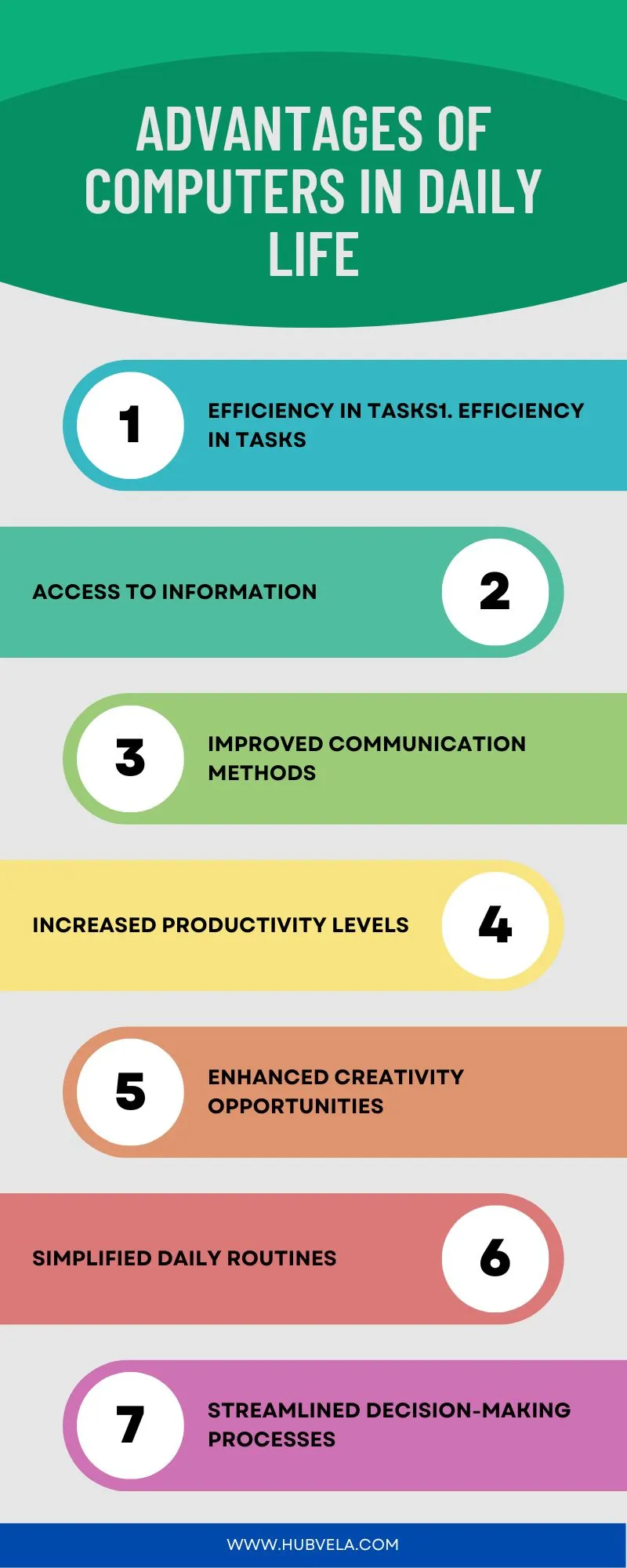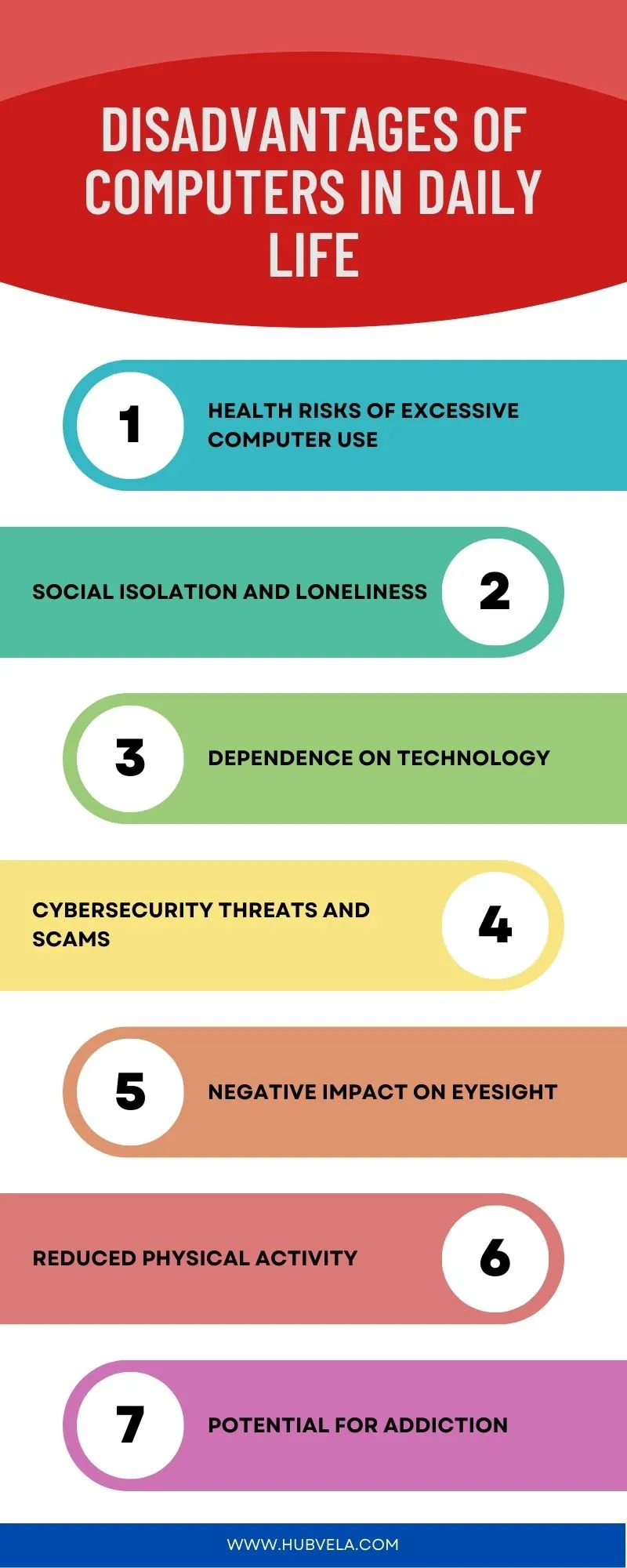In your everyday life, computers have brought both blessings and challenges. They have become an indispensable tool, making tasks more efficient and providing easy access to information.
With computers, you can communicate faster and more effectively. They have also boosted productivity levels, allowing you to accomplish more in less time.
However, there are downsides to consider. Spending excessive time in front of a screen can negatively impact your eyesight. Moreover, relying too heavily on computers may lead to reduced physical activity. And let’s not forget the potential for addiction, as the allure of the digital world can be hard to resist.
In this article, we will explore the advantages and disadvantages of computers in daily life.

--Advertisement--
Advantages of Computers in Daily Life
Computers have become an integral part of our daily lives, offering numerous benefits that enhance our productivity, connectivity, and overall well-being. Some of the key advantages of computers in daily life include:

1. Efficiency in Tasks
Using a computer can greatly enhance your efficiency in completing tasks.
Computers offer numerous benefits when it comes to improved efficiency. They provide time-saving benefits by automating repetitive tasks and reducing the need for manual work.
With computers, you can achieve increased accuracy in your work, minimizing errors and improving overall productivity.
2. Access to Information
With access to vast amounts of information at your fingertips, computers provide an invaluable resource for staying informed and gaining knowledge.
Online learning platforms make education accessible to anyone with an internet connection, bridging the gap caused by the digital divide.
The accuracy of data available online ensures reliable information for research and decision-making.
Computers also enable global connectivity, allowing people from different parts of the world to connect and share information.
However, it’s important to be cautious of information overload and to critically evaluate the sources of information found online.
3. Improved Communication Methods
Access to information has revolutionized the way we communicate, enhancing our ability to connect with others and share ideas.
Computers have played a significant role in improving communication methods. They’ve opened up remote work opportunities, allowing people to collaborate and communicate with colleagues from different parts of the world.
Computers have also bridged the global connectivity gap, reducing the digital divide and providing access to online collaboration tools, fostering effective communication and collaboration.
4. Increased Productivity Levels
By utilizing computers, you can significantly enhance your productivity levels in daily life. Computers provide various advantages that contribute to increased productivity.
Firstly, they stimulate increased creativity by providing access to a multitude of resources and tools for artistic creation and design.
Secondly, computers improve problem-solving skills by offering access to vast amounts of information and analytical tools.
Additionally, computers aid in time management, allowing you to efficiently organize tasks and prioritize them.
Moreover, computers enhance multitasking abilities, enabling you to work on multiple tasks simultaneously.
Lastly, computers provide collaboration opportunities through online platforms, facilitating communication and teamwork.
5. Enhanced Creativity Opportunities
Computers offer you enhanced creativity opportunities in daily life. With improved imagination and expanded artistic possibilities, you can explore various forms of digital art, such as graphic design or music production.
Additionally, computers enhance problem-solving skills by providing tools and resources for brainstorming and organizing ideas. They also foster increased innovation through access to a vast array of information and collaboration platforms.
Ultimately, computers can boost self-expression by enabling you to create and share your unique creations with the world.
6. Simplified Daily Routines
Streamline your daily tasks and save time with the help of computers.
Simplified routines are one of the key advantages of using computers in daily life.
With effective time management and automation benefits, computers allow you to complete tasks more efficiently.
They enable you to automate repetitive tasks, such as scheduling appointments or organizing files, resulting in increased efficiency and improved organization.
7. Streamlined Decision-Making Processes
Improve your decision-making efficiency with the use of computers in daily life.
Computers offer numerous advantages when it comes to making decisions. They allow for improved decision making through efficient processes such as data analysis, problem solving, and strategic planning.
With the help of computers, you can quickly gather and analyze data, identify patterns and trends, and make informed decisions. This streamlines the decision-making process and ensures that you’re making well-informed choices in a timely manner.
Disadvantages of Computers in Daily Life
While computers offer numerous benefits, it’s important to acknowledge the disadvantages they bring to our daily lives.
Excessive computer use can lead to health risks such as a sedentary lifestyle, eye strain, and musculoskeletal problems.
We will explore some major disadvantages of computers in daily life.

1. Health Risks of Excessive Computer Use
Excessive computer use poses potential health risks. One such risk is eye strain, which can result from staring at a screen for long periods. Eye strain can cause dryness, blurred vision, and headaches.
Another health risk associated with excessive computer use is the development of musculoskeletal disorders. Sitting in the same position for extended periods can lead to conditions such as back pain and carpal tunnel syndrome.
In addition to these specific health issues, a sedentary lifestyle, often associated with excessive computer use, can contribute to weight gain and increase the risk of developing conditions like obesity and cardiovascular disease.
2. Social Isolation and Loneliness
Using computers excessively in daily life can lead to social isolation and loneliness.
While computers have made great strides in technological advancements and have connected people through online communities, they can also hinder social interaction.
Spending too much time in front of a screen can limit face-to-face interactions, causing feelings of isolation and loneliness.
This can have negative effects on mental health, especially for those already at risk due to the digital divide.
3. Dependence on Technology
Relying heavily on technology can lead to a sense of dependence, limiting your ability to navigate daily life without the assistance of computers.
Technology addiction can negatively impact your social skills, as spending more time in the digital world can reduce face-to-face interactions.
Additionally, excessive reliance on digital platforms can stifle creativity and hinder your ability to think outside the box.
Moreover, there are privacy concerns associated with the use of computers, as personal information can be easily accessed and exploited.
4. Cybersecurity Threats and Scams
To avoid falling victim to cyber threats and scams, it’s important to remain vigilant while using computers in your daily life. Implementing cybersecurity measures and being proactive about online privacy can help protect you from data breaches, phishing attacks, and online scams.
Regularly update your antivirus software, use strong and unique passwords, and be cautious of suspicious emails and websites.
5. Negative Impact on Eyesight
To further address the drawbacks of using computers in daily life, you may experience a negative impact on your eyesight. Prolonged computer use can lead to eye strain and visual impairment. The long-term effects of these issues can be detrimental to your overall eye health.
One of the main culprits is the blue light emitted by computer screens. To combat these problems, it’s important to take preventive measures such as taking regular breaks, adjusting the screen settings, and using blue light filters.
6. Reduced Physical Activity
How does excessive computer use affect your physical activity levels?
Spending long hours in front of a computer can lead to a sedentary lifestyle and physical inactivity. This sedentary behavior has significant health consequences, including an increased risk of obesity. Lack of physical activity can have detrimental effects on your overall well-being, such as poor cardiovascular health and weakened muscles.
It’s important to find a balance between computer use and engaging in regular physical activity to maintain a healthy lifestyle.
7. Potential for Addiction
Spending excessive time on computers can lead to a potential addiction, affecting your daily life and overall well-being. The potential consequences of computer addiction include decreased productivity, strained relationships, and neglecting responsibilities.
The psychological effects can range from anxiety and depression to social isolation. Treatment options for computer addiction include therapy, support groups, and self-help strategies.
Prevention strategies involve setting limits on computer usage and finding alternative activities. Support systems, such as friends and family, can provide the necessary encouragement and accountability.
Conclusion on Advantages and Disadvantages of Computers in Daily Life
You should consider the overall benefits and drawbacks of computers in daily life before making a decision.
Computers have become an essential part of our lives, offering numerous advantages. They provide us with access to vast amounts of information, improve productivity, and allow for efficient communication.
However, they also come with disadvantages, such as the potential for addiction and negative impacts on physical and mental health.
It’s important to weigh these pros and cons to make an informed decision about the role of computers in your daily life.


